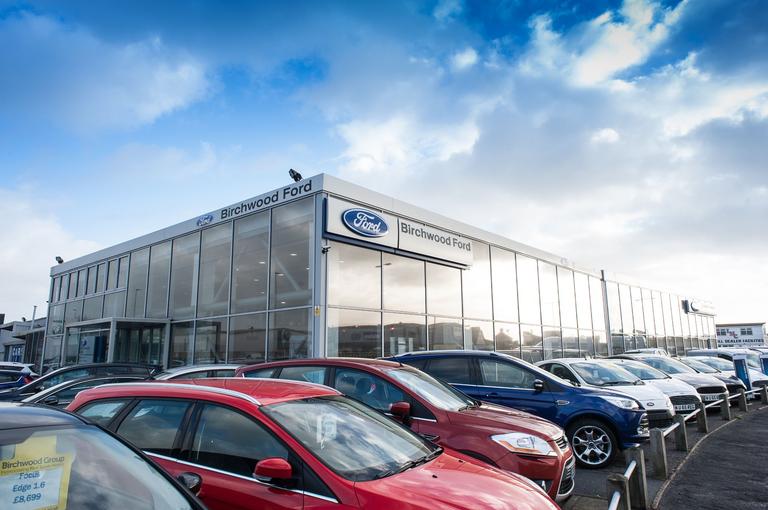
With the 30th birthday of Billing Finance approaching, Oliver Mackaness, director, and Gary Hill, sales manager, tell Richard Brown the company’s steady growth ambitions lie in organic funding.
Billing Finance began 30 years ago this spring, started by James Mackaness as a distribution and finance business for forklift trucks, spreading to the financing of used cars near the company’s Northampton base. With the forklift truck business sold in the mid-1990s, the company focused instead on leasing air conditioners and telecoms equipment, mortgages and "oddities we were financing" while car loans remained just a "local business", says Oliver Mackaness, son of James and director of the company.
Mackaness joined his father’s company almost a decade ago after several years in the world of accountancy, overseeing the transition to purely car finance in 2007, which included the hiring of Gary Hill as sales manager. The decision and both men have proven popular in the industry, with Mackaness and Hill each making the inaugural Motor Finance top 50 most-powerful people (see Issue 98, December 2012). The move came as finance companies were beginning to withdraw from the subprime sector, and was funded by a £6m loan from Lloyds Bank just before the banking crisis took hold.
"The timing was spot on," says Hill. With funds withdrawing from the marketplace, the company "had customers finding us and brokers ringing us up," many of which the company is still working with. Since then, Billing has grown "steadily", according to Mackaness, who hopes to have doubled the company’s book from 2009 to the end of 2013, aiming to lend an average £1.2m a month this year. The company has already doubled its number of accounts since 2009 but avoided an increase in arrears, which Mackaness attributes to the swell of post-2008 near-prime applicants and deals, from which Billing has been able to pick the business it writes.
"We were Northampton-based, initially," says Mackaness, "whereas now we’re dealing throughout the UK. There’s a wider market of people we’re stretching out to."
That stretch included the company’s entry into Scotland 18 months ago, based on business from brokers with knowledge of the territory, according to Hill. "From going local to going national, it was the next step," he explains.
How well do you really know your competitors?
Access the most comprehensive Company Profiles on the market, powered by GlobalData. Save hours of research. Gain competitive edge.

Thank you!
Your download email will arrive shortly
Not ready to buy yet? Download a free sample
We are confident about the unique quality of our Company Profiles. However, we want you to make the most beneficial decision for your business, so we offer a free sample that you can download by submitting the below form
By GlobalDataRichard Brown: How have you balanced growth with the automation of your systems?
Oliver Mackaness: My accountancy background instils steady, controlled growth while making sure all the systems are right.
Controlled growth is important for me, and over the next couple of years we should continue to do that. I’d like to grow by 15-20% each year. Our growth is mainly funded organically, rather than through raising finance externally.
We’ve tried to streamline everything we’ve done, so we’ve grown steadily, in a controlled fashion and we’ve alternated a lot of systems. The one thing we’re not automating is underwriting. That sets us apart from other finance companies. We will work every deal, but we are about to begin an automated decline system to weed out the really bad ones.
Gary Hill: The system is slicker, but the underwriters will physically look at the searches, rather than a computer decision. We just sped up the payout process.
We want those systems in place, but we still have the underwriters making a decision based on their knowledge and the credit search.
Mackaness: We’re not double keying any proposals. Searches are automatically generated, decisions notices are automatically sent off, docs are all automatically done. The underwriting relationship with brokersis really important.
Hill: That’s been key; they can have a discussion. We have three dedicated underwriters to look after a section of brokers. They can talk a deal through, which is how, when we were lending a lot less, we built the company and is better than a computer’s flat ‘no’.
Now it’s a question of still offering that service and to grow. The challenge is to behave like a small company but write significantly more business than we wrote five years ago. There is a core of people we’ve dealt with for a while. We’ve seen some of them grow from one man band brokers into successful brokerages.
Brown: How do you manage customer retention?
Mackaness: We are trying to get more repeat customers, to get current customers to have not just one deal, but come back and use us again.
Hill: We have a staff member to re-solicit people three-quarters of the way through a deal, identifying them on a monthly basis, and offer them the chance to change. If a particular broker gave us the deal originally, we’ll get their permission to do a search with a credit limit. We’ll then pass that back to the broker, as a fully qualified, fully accepted lead. They can then contact the customer, help them find a car. The customer will know what the payments are going to be; it’s a done deal. Obviously, they’ve got a habit of paying us. If you would rewrite the business again it should be good business and you’ve got the customer before the dealership. It can be quite a slick process. If they go back to an existing broker, then it’s win-win.
Mackaness: A lot of people grow out of a product as their financial situations and credit ratings improve, and will move on to be prime customers. But if we can show we’ve managed their account wel l throughout their history, and we’ve been efficient and polite, we can retain these customers, even if they’re paying a higher rate because they know that it’s a personal level of service. We do all of our collections in-house and each person will have a credit control manager. Over the last five or six years our credit control department has really tightened up. We’re much slicker and we’re quite strict. People like consistency, they know how we operate, they know if
they’ve missed a payment.
Brown: What’s a typical Billing deal?
Hill: We’re dealing with Average Joes, £3,500 to £4,000 balances; Focus, Astra, your normal man going to his normal job in his normal car, that’s our market. We know this is an important finance obligation. If someone’s a little bit behind on a credit card, or a mail order, but they’ve got a historical HP they’ve paid, then that’s a Billing Finance customer. This guy pays his car finance. We won’t do mortgage arrears, we won’t do large. If they have a current HP, that’s got to be up to date. Typically, it’s small default stuff we will overlook.
Mackaness: It’s a common sense approach. We have a straightforward HP product. All are deals are generally written at the same
rate as on a simple hire purchase agreement. Brokers like that; they know how they can work out the repayments. Customers like it
because there isn’t a whole raft of different offers. If the main hirer has a few issues then we’ll ask for a joint hirer, we’ll get the parents to go on. Also, we’re fairly sensible as well with the values with cars, and the values of deposits.
Hill: Other products may come in the future. We try to be easy to deal with. We have minimum deposit and loan-to-value requirements. We don’t want to lend too much on a vehicle. It protects ourselves and protects the customer. If they’re paying far
too much for a car, they’re never going to get out of it in two, three, four years’ time.
Mackaness: We reward the underwriters on the success of their underwriting. We’ll look at deals they wrote six to nine months
later and see how they’re performing; the better, the more commission.
Hill: They will perform an individually tailored earnings requirement for a customer. We will potentially accept a customer subject to working out what they are going to earn. If they’ve got big mortgages and other HP, we will do a bespoke affordability calculation covering the responsible lending aspect as well.
Mackaness: We like the responsible lending initiative, because that’s what we’re doing. The common sense approach fits in well.
Hill: And it’s a four-page document, we don’t ask for anything we don’t absolutely need. It’s streamlined, which is what the customer and brokers want.
Mackaness: We’re not scared by voluntary termination. We’re dealing with second-hand cars. Given our average loan value, if someone VTs halfway it’s not really a problem; we won’t lose a huge amount, and we can actually use it as a opportunity to get them into a new deal.
Hill: If people ring up to do that, the guys will have conversation with them. Quite often, they’re in negative equity and cannot afford to part exchange. We’ll look at the figures and may refinance them.
Brown: How has tightened supply in used cars affected business?
Hill: Dealers tell me they’re struggling to buy stock; cars are fetching a lot of money. People are buying stock because we’ve had a
very, very busy start to the year. The tail-end of last year was all up.
Mackaness: Our average deal value hasn’t gone up by more than £100 over the last five years.
Hill: We write small deals. We will do £1,500 over 18 months if that’s what somebody wants. If that helps a broker in a relationship
with a dealer, we’ll do it.
Mackaness: We’ve been able to fill a hole in the market. We haven’t got big enough yet where those pressures affect us. There’s more money about, I was slightly nervous how this year would unfold. But it’s been very busy, despite the snow.
Brown: Are people more aware and accepting of non-prime?
Hill: There are a lot more people falling into non-prime since the prime boys have tightened up. It’s a massive market.
Mackaness: People are becoming a lot more aware about how important it is to maintain your credit history. We deal with Experian, which is becoming a lot more known. That’s a good incentive for people to maintain their HP payments. They know it’s a springboard into prime.
People are organising their finance first and feeling more in control, safe that they’re not going to be ripped off.
Hill: More brokers are catching up to that way of thinking.
Mackaness: We’ve got a few brokers who are setting up their own distribution centres, not only acting as broker but selling the car.
Hill: They’re trying to get applications online, get an acceptance, then invite them down, show them the car; like a one-stop shot.
With a credit line already in place, people feel in a better position to negotiate a deal.
Brown: Where do you see the recession? How does this affect business and the non-prime market?
Mackaness: Youth unemployment is a real issue. If we have a young applicant, we will try to get a parent or older person to come along to insure against that.
People are holding onto their jobs and accepting pay cuts, but they still need their car. I guess I’m surprised we haven’t had any major increases in our arrears.
It’s worrying, seeing high street shops closing. Our customers work in shops that are going under and I don’t know where they are going to get employment from.
Hill: If we know someone is on a short-term contract that is something we look at. There are more agency and temporary workers
and it all feeds into the decisions we make.
Brown: Why is organic growth important?
Mackaness: We’re growing organically because, if we’re just borrowing lots of money, then actually the value of the company isn’t going to increase a huge amount.
Also, we’re a manual underwriter. If we’re using invoices and discounting, it’s quite hard for external people because they want to know what rules we will use. An invoice discounting house or a bank would like us to use credit scores, not ‘common sense’ manual underwriting. If we suddenly doubled in size, then it’s easy to lose control and start writing bad business.
Hill: We’ve got control. We want to keep the service levels up and maintain the personal relationships the staff have got with brokers
and dealers. If you suddenly write two million deals in a month, it will go wrong very quickly. We’ve grown slow and steady but
sustained over the last five years.
richard.brown@timetric.com







